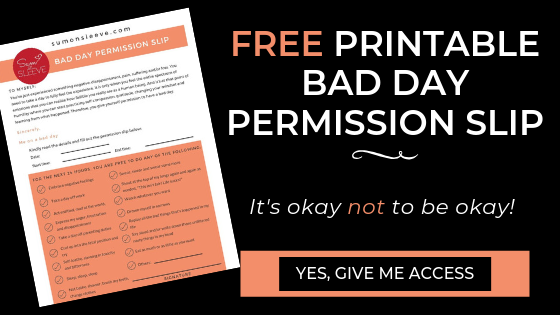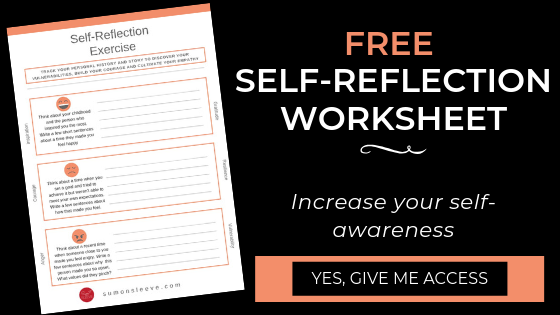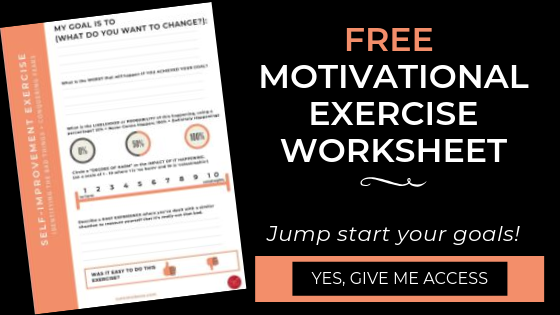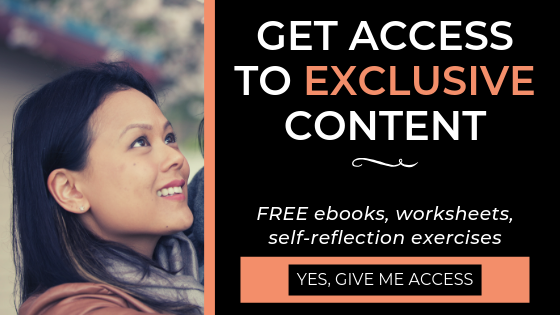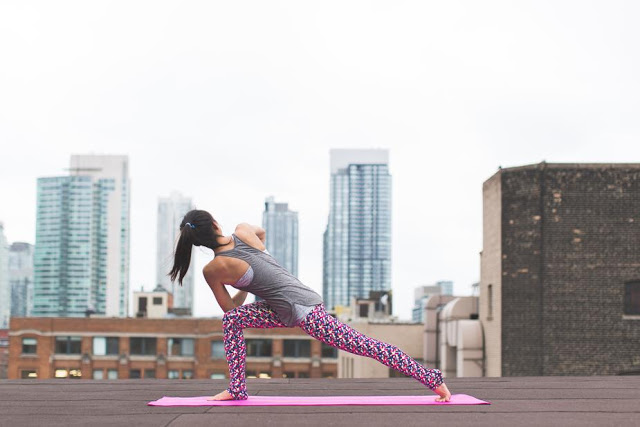
I have a full-time day job. I’m a mom. I’m a blogger. I have a lot of things going on.
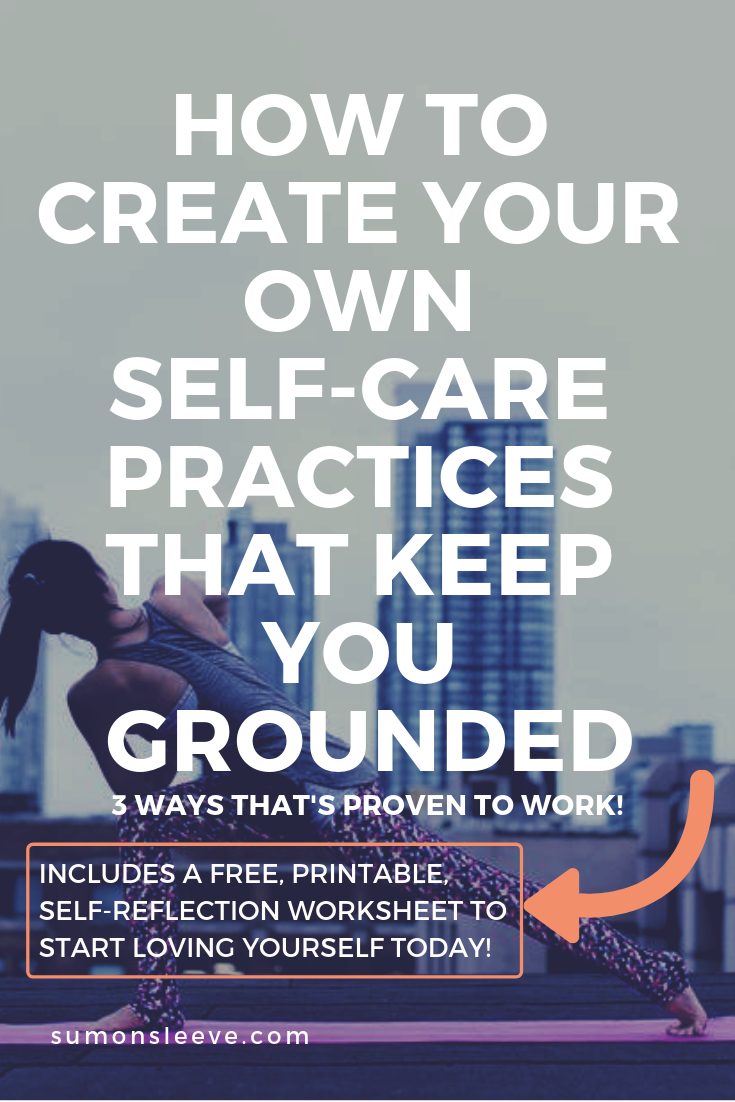
It can be overwhelming and almost every month, I reach a breaking point. But somehow, I manage to get myself together, patch up those loose seams and carry on.
Last summer, I became fed up of that cycle so I asked myself, “What can I do to minimize the build-up so that the breaking points don’t happen?”
Every day, we are exposed to constant streams of information within access of our fingertips, telling us about the magical ways to live happier, healthier and wealthier.
We can’t do everything and we shouldn’t do just anything but we
I began thinking about all the self-improvement information that I’ve gathered from workshops, conferences, Ted Talks, podcasts, conversations with friends, co-workers, and family, random articles/videos in my social media feeds etc.
And I distilled all this information into 3 realistic and meaningful practices that I can actually do for myself almost every day. Since following them, I feel like I’ve been more grounded.
I hope sharing my self-care practices will inspire you to wade through that information overflow and filter what resonates with you to help maintain a sense of calm in the sometimes chaotic mess called life.
Also, I’m curious to read this in the future to see how I have evolved.
Disclaimer: I am not a medical expert so please consult your physician before following any of this blindly. Be smart about it, ya know?
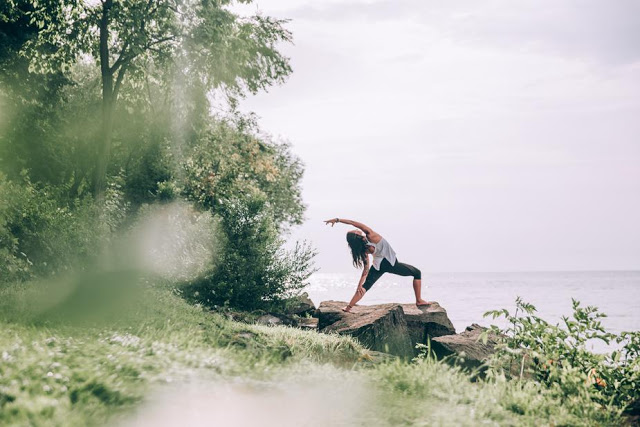
Combining Yoga and Meditation
I had an on and off relationship with Yoga.
For most of my life, I’ve alternated between running and going to the gym. I joined the local recreation centre at the age of 14 and basically fell in love with strength training so much so that I did my undergrad in Kinesiology.
I have a naturally muscular and athletic build and so for most of my adult life, I’ve strived to build muscle and improve cardiovascular endurance. I’ve always had this misconception that yoga was for stretching and something you do after a “real workout” if you had the time.
That was until I met my husband who has been practicing yoga for the past 6 years.
He convinced me to try it so I took the plunge and paid for an expensive annual pass. Every night, we went to a power yoga class together.
Downward Dog, Upward Dog, Chaturanga, Savasana…
Then when I was 5 months pregnant, we moved and I stopped going. I somehow convinced myself again that yoga “just wasn’t my thing.”
After, my workouts became a mindless activity, a checkbox. I’d go on the elliptical/stationary bike/treadmill and put a Hallmark movie on; before I knew it, my 30 minutes was up and I’d be so relieved that it was over.
However, I wasn’t getting any joy from the actual workout. I’d be drenched in sweat and my legs would be sore the next day, but that wasn’t helping my feelings of being overwhelmed, contributing to that monthly breaking point.
So one day while searching on YouTube, I found a yoga routine and decided to try it on a whim. This one was perfect at just under 30 minutes. I tried it and I felt this high I had never felt before. My body became invigorated as though I had gotten a massage and my lymphatic system was reactivated.
So I started doing this routine again and again, every day until it got to the point where I had memorized the entire set.
Now, almost every day, I’ll put some zen music on, do this routine and practice mindfulness through almost the entire thing. I’ll pause in a pose whenever I’m needing an extra push. I don’t need equipment and I can literally do it anywhere. And when it’s over, I’m elated rather than relieved.
I think before becoming a mom, with fewer responsibilities and more time, yoga just didn’t feel right. I had these extrinsic goals to meet. I didn’t need to make time for myself. I could easily pick up and go.
Now as a mom, my time is a scarce commodity. So if I’m going to exercise, I might as well get the biggest bang for my buck by doing something that maximizes both my physical and mental health.
How To Create Your Self-Care Practice:
Incorporate Meditation In Your Daily Exercise
Exercise, exercise, exercise. Everyone knows they should exercise.
Sitting
Move more.
Sweat every day.
What do you do for exercise?
Dancing? Walking? Kettlebells?
Whatever it is, try and meditate during the session.
Turn off the TV.
Put your phone aside.
Focus on your breath…inhale, exhale
Pay attention to how your body is moving
Do a body scan from your toes to your head. How does everything feel?
Stop viewing exercise as something you dread since you “have to do it.”
Instead, seize the opportunity to mentally check out. Your mind and body will thank you.
Viewing Intermittent Fasting As A Spiritual Practice
I’ve mentioned before that I don’t eat breakfast and that I practice intermittent fasting 4-5 times a week (usually for 15-16 hours). I’ve been doing this for the last 2 years because it works for my body.
It’s an easy and efficient way to manage my meals (ie. fewer meals to prepare and plan for)…plus a bunch of health benefits that other blogs have already talked about.
However, it wasn’t until I heard Terry Crews on Tim Ferris talk about how fasting is a “spiritual thing” for him that something clicked in my head. To me, the physical and practical benefits of fasting are a given but they don’t give me a meaningful purpose to do it.
The practice was something I just do.
However, I hadn’t realized the mental and spiritual effects that fasting has. I was merely going through the motions without being mindful about the actual process. This change in mindset has helped keep me grounded.
The hour before I get to eat, I do my yoga routine. The feeling of hunger along with the mindful practice makes the experience incredibly humbling.
The discomfort of having fasted for about 15 hours actually enhances my ability to be mindful of my body’s movements, redirecting my thoughts about my daily tasks to what I’m feeling at the moment.
When it’s time to eat, that feeling I get before I take the first bite of whatever I’m eating reminds me to be grateful to have access to food pretty much whenever I want.
Imagine I didn’t know when my next meal was.
Imagine I didn’t know when this feeling would end.
When I finish my last meal before starting the fasting phase, there’s the same elated feeling I get after my yoga practice. My belly is full. I feel warm and fuzzy because my body is whole again.
I don’t know how to describe it but it’s definitely a spiritual thing.
How To Create Your Self-Care Practice:
Test Your Limits To Reinforce Gratitude
What have you taken for granted over the years and is no longer an indulgence but instead, has become a given?
What is something you can do every day that makes you slightly uncomfortable but also make you appreciate the good things you have in your life?
Do a little self-experiment.

Do you always put cream and sugar into your coffee?
What if you tried it black for a month?
How bitter would that first sip of coffee taste compared to the sip you take at the end of the month?
How would that sweet and creamy coffee taste after?
Pretty damn good?
Or perhaps you would prefer the black coffee and actually start to appreciate all the different coffee notes (citrus, floral, earthy, spicy) all those hipsters are raving about.
Do you always have your phone with you in case you get into an awkward scenario where you have to wait in line to buy a coffee and there is nothing for you to do?
What if you embraced that discomfort and actually noticed the details around you? The smell of the coffee brewing? The beautifully decorated cupcakes in the glass display?
What if you didn’t check that notification on your phone?
Would you appreciate it more when you did?
Or perhaps you’d realize you didn’t need to check it all and save yourself those few minutes of distraction.
Do you eat dessert every day?
What if you split that dessert into 3 pieces and ate a piece of it every other night?
How much would you savour each last bite?
How much more would you look forward to it?
Brush Your Teeth Mindfully
A few months ago, I finally got rid of my toothbrush and bought one of those electric ones.
“Yes, welcome to the future, Katharine!”
These things have a timer on them that tells you when to switch from top to bottom. When I first started using it, it felt like ages before I could switch sides.
I had no patience for this (Ain’t nobody got time for this!) so I started doing other stuff while brushing my teeth, whatever I could with one hand (pee, check my phone, pick out my outfit, do my eyeliner etc).
Almost every time, the toothpaste suds from my mouth would drip onto my clothes, making me wipe it and change my shirt, adding extra time to my already busy morning.
“No Más!”
I had to stop multitasking.
So every morning and night when I brush my teeth, I force myself to be mindful. Every swirl, every spin, every brush, I am one with my teeth every step of the way.
Sounds kind of lame, but it’s working.
Embed Mindfulness Into A Daily Chore
What is something you have to do every day?
Shower?
Put on clothes?
Take off clothes?
Wash your face?
What chore do you despise? Love?
Putting dishes in the dishwasher?
Laundry?
Vacuuming?
Choose one of these chores and do them mindfully.
Pay attention to every detail.
For instance, the simple act of washing your hands which I think most people do too quickly (including myself) anyway.

Wait for a moment when your hands are extra dirty, perhaps just having eaten hot wings/saucy ribs/oily pizza?
Move your fingers around to feel the stickiness between all the crevices.
When you turn the tap on, pay attention to the sound of the water hitting the sink.
As you immerse your hands into the rushing warm water, notice the colour of the sauce leaving your hands.
Take a deep breath and savour the smell of the soap.
Caress each fingernail, each joint, each palm.
Massage each finger and thumb.
Compare the feeling of your clean hands with the memory of your dirty ones.
Rinse and repeat.
